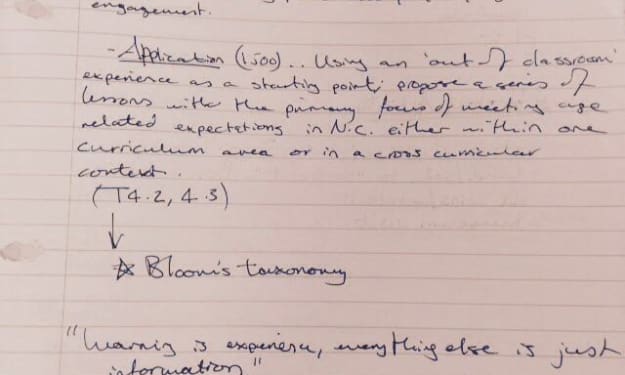Educated Out of Creativity
A consideration of the UK's national Curriculum

I went to university with the concrete plan that I was going to train to be a primary school teacher, something I'd wanted to do since I was fourteen. The course was four years long and would give me the QTS qualification (qualified for teacher status). I had the time of my life, I learned so much, and met people that I will call my friends for decades to come, but I hated the course. 90 percent of it was dull mind-numbing information, that whilst we had to know, it was soul-destroying having lecturers trying to make formative assessment sound interesting. The other 10 percent was incredibly interesting, understanding how children learn language and develop cognitively, the different theories of learning, even writing the essays we were assigned. And this was only when we were in uni. The rest of the time we were on placement in local schools. The university assigned us our schools, a different one each year and gave us new objectives to focus on. Over the course of the four years, we would take over more and more of the class timetable as our skills and confidence grew. Our class teacher(s) would help us with our planning, help us with the curriculum and what topics they wanted the kids to cover. Their jobs were to guide us, point us in the direction of success and support us in our formal observations. The observations, I should explain, could make or break us. Some were graded, others weren't, but they had the power to build and destroy our confidence in our abilities in equal measure. Unfortunately, we found that it was pure luck of the draw whether your school/teacher/overall placements was going to be a good one. Everyone I know, myself included, had a bad experience on placement, either there was a personality clash with the teacher, lack of guidance, lack of care if you succeeded or not, a bad observation. Tons of reasons, none of which were good enough reasons. I found that there were a lot of politics amongst the staff wherever you were. Underlying agendas and deep rooted feuds, never a good thing in a mainly female profession. Gloves were off and the bitchiness spread like wildfire.
I'm not knocking teachers. They do more work than any other profession I know and do not get paid enough for all they do. I know that better than most. However, all these things added up and suddenly my dream of teaching was dead and I could think of nothing worse than devoting my life to a career that would probably kill me, if not emotionally then certainly physically. So I made the hardest decision I've ever had to make, I left with one year to go, graduated with a degree in Primary Education without QTS.
We can all relate that there were subjects at school that we like or were good at but were discouraged from. Other teachers didn't see the point of them or thought that their subjects were more important. I loved art and drawing, but at the end of the day my teachers knew I was less likely to get a sustainable job in art than if I studied something more academic. Now, I obviously didn't go on to be a great artist, but could I have done given the proper encouragement? Picasso did. That's the problem though. Today's education system was devised during the Industrial Revolution when the likes of maths and English gave you a better chance of getting a job. Two hundred years later and we know that employment is possible is all subjects, yet the system remains unchanged and somewhat outdated. Picasso said "All children are born artists," but the challenge is to remain an artist as we grow up, and our children seem to be being educated out of expressing creativity.
When people ask me why I left teaching, I say I couldn't cope with the politics and that's partly true, but mostly I couldn't cope with the concept of teaching a curriculum that is constantly changing and inconsistent with the previous year's. It seemed to me that they put unnecessary impact on subjects that were not always suitable for the children. What use is trigonometry to a child who struggles with academia but whose practicalities could enable them a trade? Their amazing creative talents should be encouraged and given the right environment to thrive and flourish, and why shouldn't we do what we can to aid that?
Teaching may not be my destiny now, and I'm okay with that, my education has been and went. At the end of the day, I'm no longer the future of this world. The education systems need to be reevaluated to include the more vulnerable children and positively challenge them to be the person they want to be.
But that's just my opinion.
About the Creator
Louisa Jane
British.
Paediatric speech and language therpaist.
Art enthusiast.
Amateur-dramatics amateur.
Francophile.
Traveller.
People person.
Of the general happy-go-lucky sort :)






Comments
There are no comments for this story
Be the first to respond and start the conversation.